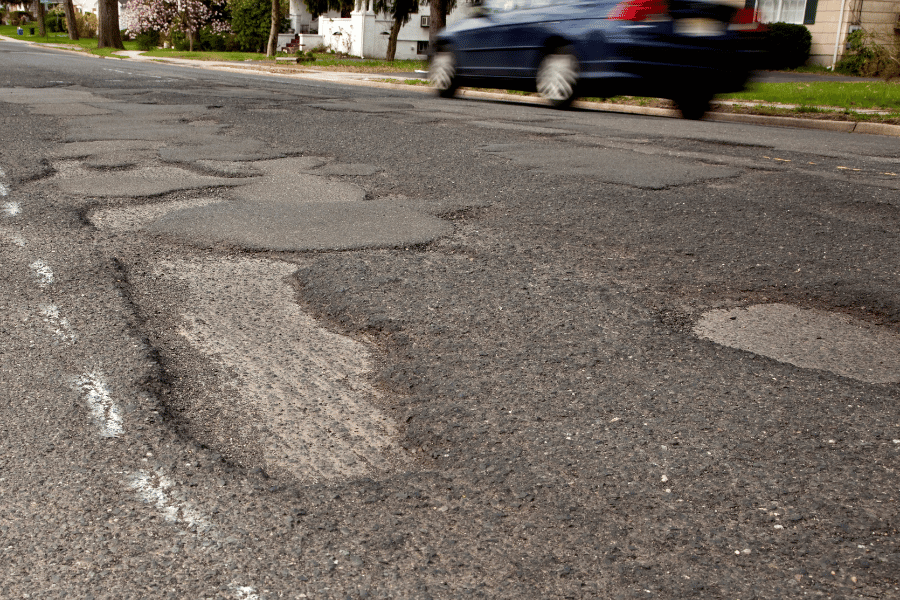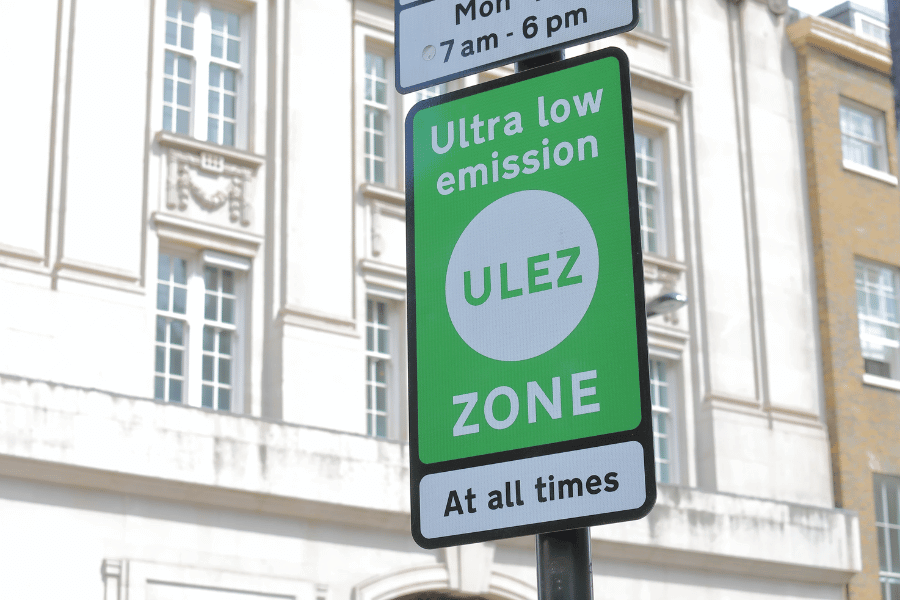The United Kingdom general election will be held on July 4. By now all political parties have published their general election manifesto. In this blog, Magda Cepeda-Zorrilla compiles a summary of the transport-related proposals from the Labour, Conservatives, Reform UK, Liberal Democrats and the Green Party.
Potholes
With a focus on modernizing Transport Infrastructure, Labour aims to address long-delayed road projects and resolve pothole issues, additionally, by deferring the A27 bypass, an extra one million potholes will be fixed annually. The Conservatives plan to redirect £36 billion of savings from the HS2 to improve local and regional transport as well as to take immediate steps to help people with public transport needs. Reform UK emphasises the importance of having integrated services and they plan to focus on accelerating transport infrastructure by improving existing rail and road links, focusing on the coastal regions, Wales, the North, and the Midlands. Neither the Liberal Democrats nor the Green Party have stated specific clear objectives on this topic.
Buses
The Liberal Democrats plan to boost bus services by supporting rural routes and promoting alternatives like on-demand services where traditional options are not viable. They will maintain the £2 cap on bus fares while reviewing fares and propose a single, integrated fund for local authorities to expand services and switch to zero-emission vehicles. The plan also extends current programs to transition entirely to zero-emission buses and aims to make public transport more affordable for young people by extending half-fares to 18-year-olds and introducing a ‘Young Person’s Buscard’ for 19- to 25-year-olds, offering a third off fares. Labour’s plan for reforming bus services includes giving local leaders the authority to franchise and control routes, lifting the ban on municipal ownership, and enabling community control over routes and schedules. The Conservatives’ bus fare initiatives involve extending the £2 fare cap in England for the next Parliament, funded by railway reform savings of up to £1.5 billion annually. Reform UK and the Greens have not specified objectives for buses.
Rail
The Liberal Democrats aim to make rail travel more convenient, affordable, and environmentally friendly for both passengers and freight. They plan to establish a new Railway Agency to integrate the industry, prioritize commuters, hold train companies accountable, and reform the fare system. Their proposals include measures against poor-performing operators, an annual rail pass, improved station accessibility, Northern Powerhouse Rail, and a review of the northern leg of HS2. They also support light rail schemes, a ten-year rail electrification plan, a national freight strategy, an international rail strategy, and integrated ticketing systems with a daily fare cap. Labour plans to overhaul railways by bringing them into public ownership as contracts expire, creating Great British Railways for a unified, reliable, and affordable system. Their focus includes investment, efficiency, safety, mayoral involvement in local services, and a new passenger watchdog. The Conservatives propose a Rail Reform Bill to create Great British Railways, headquartered in Derby, with a private-public partnership, simpler tickets, expanded private sector roles, open access services, reformed working practices, and a nationwide rollout of mobile pay-as-you-go contactless tickets. Reform UK aims to scrap HS2 and save £25 billion by halting the project. The Greens have not stated anything in their manifesto.
Transport Safety
Labour, Reform UK and Liberal Democrats have not set any specific objective regarding Transport Safety in their manifesto. The Conservatives have a focus on not investing in new smart motorways, but rather improving the safety of existing ones. The Green Party has stated in its manifesto it will focus on safe streets and set up very specific goals for walking and cycling (described below).
Active Transport
The Greens stated very specific goals, to improve walking and cycling, for instance, they plan to invest £2.5 billion annually in new cycleways and footpaths and to “reimagine” the use of streets in residential areas to reduce traffic and open them up for community use, and adopt Active Travel England’s objective of having 50% of trips in England’s towns and cities be walked, wheeled, or cycled by 2030. Labour aims to promote integrated transport systems by enhancing active travel networks and ensuring seamless journeys, alongside developing a long-term strategy for efficient transport infrastructure delivery. The Conservatives plan to collaborate with Active Travel England to create safer walking and cycling environments, ensure new schemes have local support, and align penalties for dangerous cyclists with those for other road users. Reform UK and Liberal Democrats did not mention any specific objective for walking and cycling in their manifesto.
Air Transport
For air transport, There are significant proposals from the Liberal Democrats, Labour and the Green Party. For instance, the Liberal Democrats aim to reduce the climate impact of flying by reforming the taxation of international flights to target frequent flyers while reducing costs for ordinary households, introducing a super tax on private jet flights, and removing VAT exemptions for private, first-class, and business-class flights. They also propose that airlines display carbon emissions for domestic flights compared to rail options at booking, ban short domestic flights with direct rail alternatives under 2.5 hours unless planes use alternative fuels, and place a moratorium on airport expansion until a national capacity and emissions management framework is in place. The Green Party advocates for a frequent-flyer levy, a ban on domestic flights for journeys under three hours by train, and a halt to new airport capacity expansion. The Conservatives and Reform UK have not specified anything about air transport in their manifesto.
Electric Vehicles
The Liberal Democrats plan to make charging electric vehicles easy and affordable by significantly increasing the number of charging points, including residential on-street points and ultra-fast chargers at service stations. They also support new charging points with upgrades to the National Grid and local grid capacity, propose cutting VAT on public charging to 5%, and require all charging points to be accessible with a bank card. On the other hand, Labour aims to modernize transport infrastructure by tackling high car insurance costs, supporting the transition to electric vehicles, accelerating the rollout of EV charge points, and promoting the use of second-hand electric cars. Regarding this topic, the Conservatives, Reform UK and the Greens Party have not stated any specifics in their manifestos.
Private vehicles
Parking Policies
Only Conservatives have specified a policy for parking. They plan to implement parking initiatives by rolling out the National Parking Platform to simplify parking payments and giving councils the power to ban pavement parking through community engagement. The rest of the parties have not stated any specific policy for parking.
Support for drivers
Conservatives, Reform UK, and Liberal Democrats have expressed support for private drivers. The Conservative party plans to prioritise Fuel Duty freezes and introduce a ‘Plan for Drivers’ with better use of bus lanes, penalties for overrunning street works, consistent enforcement of yellow box junctions, allowing motorcycles in bus lanes, and reforming motorcycle licensing. They also propose a Drivers Bill to stop road pricing, reverse the ULEZ expansion, and rule out blanket Low Traffic Neighborhoods and 20mph zones. Reform UK plans to ban ULEZ Clean Air Zones and Low Traffic Neighborhoods, scrapping Net Zero objectives, but retaining low speed limits where safety is critical. The Liberal Democrats aim to protect motorists from rip-offs, including unfair insurance and petrol prices. The Greens and the Labour have not specified any policy to support drivers.
Summary
In summary, from their manifestos, the Liberal Democrats have outlined the most comprehensive transport proposals, covering various aspects from rail to air travel. It could be desirable to find more information about accessibility and inclusion by all the parties, for instance, proposals for more inclusive transport planning and services ensuring transport is accessible for disabled people and specific policies to support older people in using transport. However, it is reassuring to see that there are some very detailed proposals for important topics such as rail, electric vehicles and active transport.
Sources:
Labour Party Manifesto 2024. My plan for change
The Conservative and Unionist Party Manifesto 2024
Reform UK: Our Contract with you
Liberal Democrats. For a fair deal Manifesto 2024
Green Party. Our 2024 General Election Manifesto
This blog was written by Dr Magda Cepeda-Zorrilla, Research Fellow, City-REDI / WMREDI, University of Birmingham.
Disclaimer:
The views expressed in this analysis post are those of the authors and not necessarily those of City-REDI, WMREDI or the University of Birmingham.



